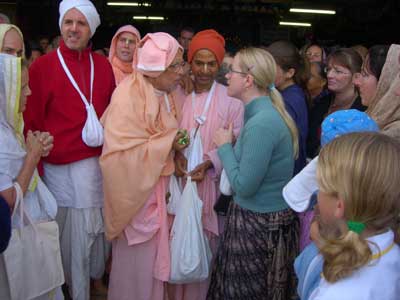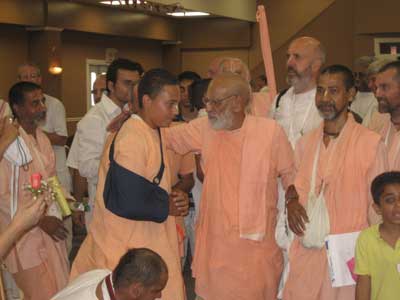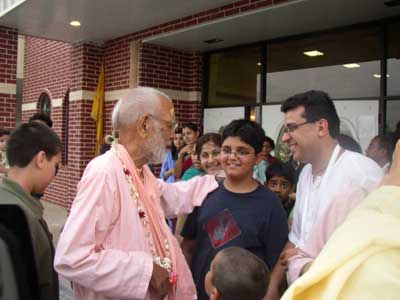

[This following is an excerpt from the introductory lecture of Srila Bhaktivedanta Narayana Gosvami Maharajas six-day discourse on the book, Sri Bhakti-tattva Viveka. This lecture was given in Badger, California.]
First try to give up all the manifestations of your false ego like anger. If you have so much anger, you cannot understand topics about bhakti.
Try to be very humble:
trnad api sunicena taror api shaisnunaThis principle should not only be seen and practiced in Sri Caitanya-caritamrta; it should enter your heart. If you are not following this, but you are always in an arrogant mood and telling others, You should obey me, I will not obey you. What I am telling is true to the highest extent not considering what the other person is telling you, or whether he is giving good or bad advice this is not good. Do not be like this.
amanina manadena kirtaniyah sada harih[Thinking oneself to be even lower and more worthless than the insignificant grass which is trampled beneath the feet of all, being more tolerant than a tree, accepting no honor, but offering respect to all others according to their respective positions, one should continuously chant the holy name of Sri Hari.
(Siksastam, verse 3)]
Try to be like Sri Caitanya Mahaprabhu and His associates. They were so broadminded. Always see what other persons want. Try to realize their difficulties.

We should try to understand the suffering of another person. We should try to keep our own mood concealed, and try to accept and hear the other persons mood. We should try to understand the happiness and distress of another. We should give up our own moods and hear the other persons moods. Then, together, we can consider what to do. If we do not hear the other persons mood, but rather keep our own mood prominent, this is not called association.
There are four duties of a madhyama-adhikara: love (prema) to Sri Krsna or Sri Caitanya Mahaprabhu, and friendship to Vaisnavas. We should give friendship and service to superiors. To those who are equal, we should give deep friendship. To those who are junior, we should give friendship with some mercy and compassion.
Kanistha Vaisnavas, those who are not very advanced, should be given a great deal of mercy. Always tell them hari-katha. They may do something wrong, but we should tolerate that. If doctors are going to operate on someone, and that person abuses the doctor or others, still, the doctor very patiently tolerates and does the needful. So, we should tolerate all these things; we should obey this principle.
We should try to neglect those people who have an opposing mood and are making some offense, but we should not quarrel with them. We should follow the example of Prahlada Maharaja the way in which he reciprocated with his father. We should also follow the example of the way in which Yudhisthira Maharaja reciprocated with the inimical Duryodhana. Yudhisthira Maharaja never called him Duryodhana, but rather Suyodhana. [Duryodhana refers to a bad person, and suyodhana refers to a good person.] Also, he addressed the demon Dushasana as Sushasana.
We should try to follow all of these principles. This is the ground-level the platform of bhakti. If the platform is not made, then all these showers of instructions [the instructions he is about to give in his six-day discourse on Sri Bhakti-tattva Viveka) may come but will not remain with you. If your ego is like a mountain, this shower will go down the mountain; it will not remain on it. Those who are polite, trnad api sunicena, will gain everything; and those who are proud will gain nothing.

Editorial Advisors: Pujyapad Madhava Maharaja, Sripad Brajanath dasa, and Sri Prema-prayojana dasa
Transcriber and typist: Vasanti dasi
Proofreader: Krsna-kamini dasi
Editor: Syamarani dasi
HTML: Bhutabhavana dasa
![[BVML Home Page]](../../grfx/bml_logo.gif)
